#fushiguro megumi analysis
Explore tagged Tumblr posts
Text
short nanami & megumi speech analysis
it's so interesting to me how nanami's speaking mannerisms translate through culture. not hating on how anyone writes him or anything, i just find it interesting.
because most of the time in fics/smaus kento speaks like he's writing a work email, right? very professional-esque, something you'd relate to a corporate setting, or just very rigid/ no slang way of speaking. when in japanese he just speaks very formally. even in fights he takes the extra time to use the polite words (which is often a longer way of saying things -- which now that i think about it would technically be how he's characterized in english if we're talking about how lengthy the sentences get i digress)
i think the only time he broke polite speech was in the fight with dagon when he called everyone to gather.
it also does make me think about megumi bc he's about the only other character who constantly uses polite speech even in the fight with dagon and any other fatal battle. with the other first years his speech is more lax and casual because they're of the same age and status but way more polite than you'd hear teenagers talk (at least in the 'verse)
in contrast he doesn't actually use polite speech when he talks to tsumiki, at least from what we saw (and i haven't fact checked myself but i also think he drops polite speech when he thinks to himself whereas i believe nanami still uses polite speech when he thinks)
this lowkey makes me headcanon that kid megumi shadowed nanami during a mission once and the way he carried himself just had megumi's eyes gleaming.
especially bc of his speech the earliest we've seen him (when he first meets gojo) he uses "あんた誰" antadare = who are you? the use of あんた anta being rude especially to a stranger. he was also in first grade so he probably just switched to using polite speech after learning, but i'm gonna stop here bc i only meant to talk about nanami but now im thinking about how itadori's speech changed just very slightly when he was talking to ozawa since he called her "ozawa-chan" and he usually only uses the suffix honorifics like -sensei--
idk how i got here
anyway good luck studying japanese, yall!
i've also been wanting to talk about the change in characters' character when they have siblings and their change in speech just across some of my favorite anime but i need to fact check myself lol
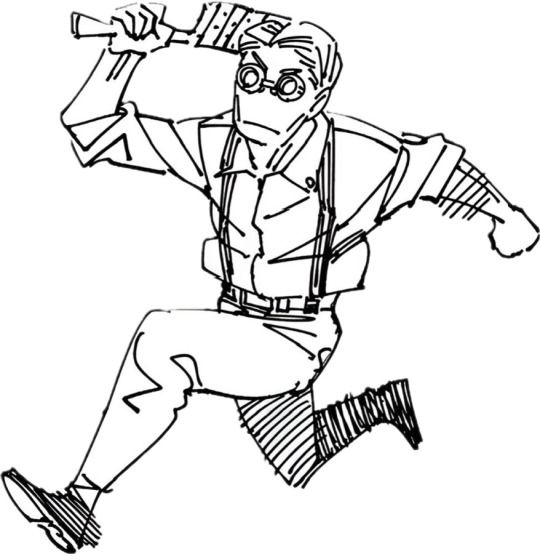
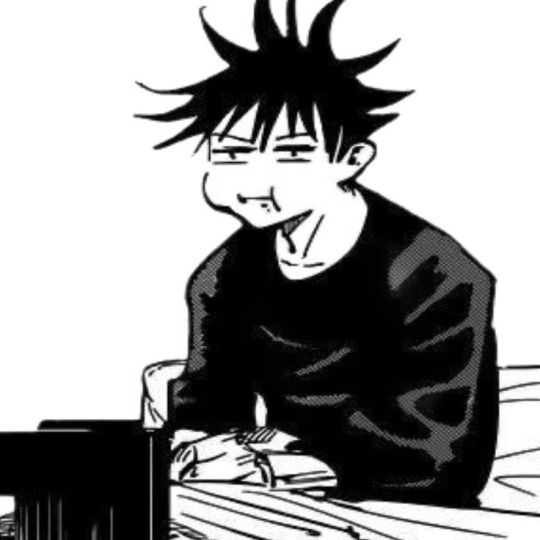
#jjk#jujutsu kaisen#nanami kento#fushiguro megumi#jjk analysis#nanami kento analysis#fushiguro megumi analysis#fushiguro megumi headcanon
76 notes
·
View notes
Text
Gojo Satoru visiting Kugisaki nobara while she is in coma, sitting next to her, and talking to her. Gojo Satoru swapping souls with Yuta okkotsu, teaching him everything he knows about his cursed technique. Gojo Satoru hiding Sukuna's last finger to indefinitely postpone Yuji's execution. Gojo Satoru who bore the burden of being a monster, killed all the higher ups alone because he refused to let his students watch such gruesome sights. Gojo Satoru who believed he would win right til the end. Gojo Satoru who died knowing his students had got it from there, that they would be able to save Fushiguro Megumi. Gojo Satoru who let his body be used as puppet after his death. Gojo Satoru who died knowing all his students would be saved.
#satoru gojo#my love my heart my blue eyed princess#jujutsu kaisen#jjk#gojo satoru#best teacher gojo satoru#gojo satoru meta#jjk meta#jjk manga#jjk 266#jjk 267#jjk manga spoilers#kugisaki nobara#yuta okkotsu#inumaki toge#fushiguro megumi#itadori yuuji#jjk trio#jjk leaks#jjk spoilers#gojou satoru#jjk gojo#gojou#satoru gojou#jjk nobara#nobara kugisaki#jujutsu kaisen spoilers#megumi fushiguro#itadori yuji#character analysis
4K notes
·
View notes
Text
the whole story of jjk is a parallel about megumi (the blessed prodigy) and itadori (the cursed finger eater) exist because of gojo (the prodigy) and geto (the curse eater/manipulater), they parallel to each other a lot except megumi shows the signs that he can be saved unlike geto who was too far gone before he could be saved. they fight in the same way, for the same reasons but this time maybe they will break the cycle. walk with me here...maybe itafushi will be the proof that no matter how fucked up the world is and how odds are stacked up against you, there is still a chance that you can change history.
#this is like a full circle moment but we are breaking the cycle of trauma#jujutsu kaisen#jjk#jjk spoilers#gojo satoru#geto suguru#satosugu#stsg#itadori yuji#megumi fushiguro#itafushi#jjk leaks#jjk manga#jjk meta#jjk analysis#400#500#600#700#800
1K notes
·
View notes
Text
Gojo cares a lot, actually
Perspective and empathy in Jujutsu Kaisen
Once again, I see accusations that Gojo only cared about people in relation to their strength. I can't believe that 236 and 261 haven't put this idea to bed already, but let's go over it again for the class. Here are some thoughts on the importance of perspective and empathy in JJK. Spoilers for chapter 266 ahead!
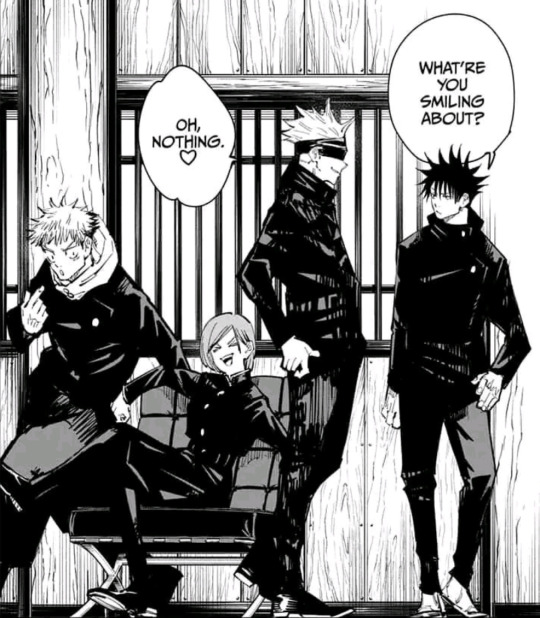
In 236, Gojo tells Geto he loves everyone. This single line, direct from the man's mouth, should be enough. However, moments later, Nanami says, "You never cared about protecting people". So why do some readers only take one of these perspectives at face value?
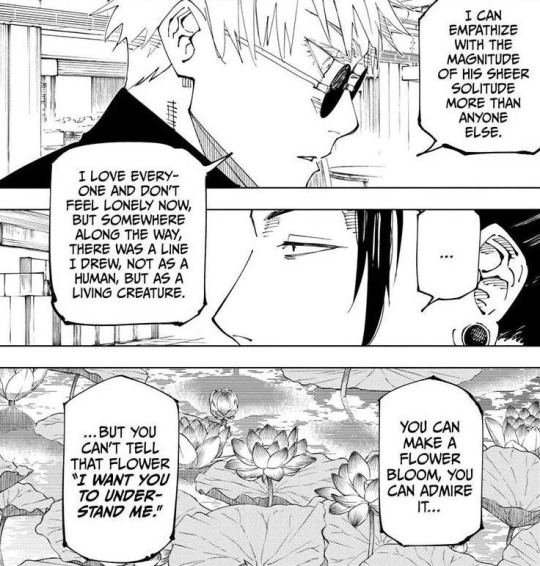
Perspective matters in JJK. Often, characters and even the narrator state things that are only true from their perspective in a given moment. What you choose to believe says more about you than it does about them — an idea I explored in my analysis of 236.
This is particularly important when it comes to Gojo and Megumi, because the moment they meet is the only (?) scene in the whole of JJK that we get to see from two perspectives.
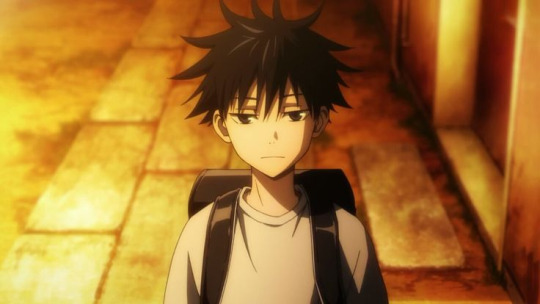

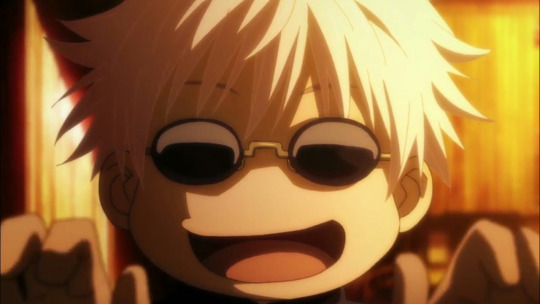
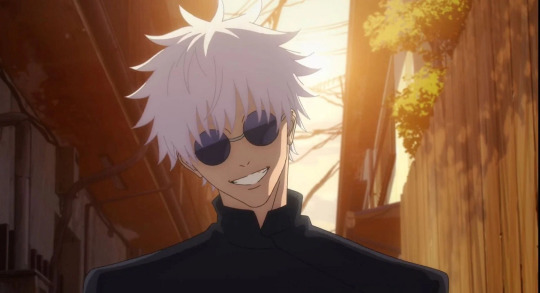
The second time, the reader understands the emotional weight of it for Gojo — but Megumi doesn't. He's kept in the dark, so of course he thinks about their meeting in different terms.
Once again, whose perspective are we going to take at face value? From Megumi's point of view, he wasn't offered a choice. From Gojo's point of view, he extended to a child the little agency available to him.
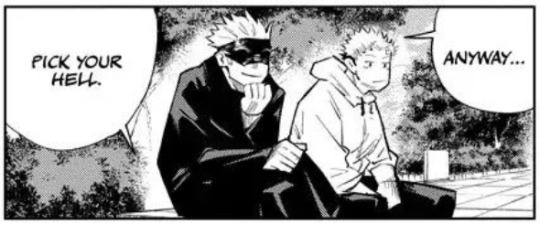
Offering a choice is something Gojo does consistently throughout JJK — pick your hell. It's one of the ways he shows care for others that goes unrecognised, so it's ironic that readers and characters alike misinterpret it for a lack of empathy. However, this is no coincidence.
For much of the series, Gege keeps Gojo at a narrative distance from the reader. Most of what we know about Gojo comes from what other characters tell us, and our view of him is therefore coloured by their perspective.
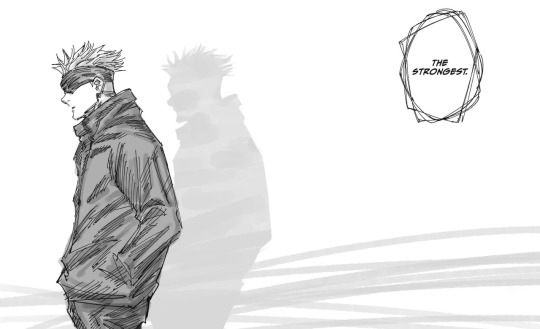
However, while Gojo laments the distance between himself and others, he fails to recognise that he's the one maintaining it — and not because of his strength or his technique. He has admirable goals, but he chooses to work towards them alone.
There are many occasions where characters reach for Gojo, but he refuses to let them past his metaphorical Infinity out of a sense of duty and perhaps misplaced belief that he alone can or should bear this heavy burden.
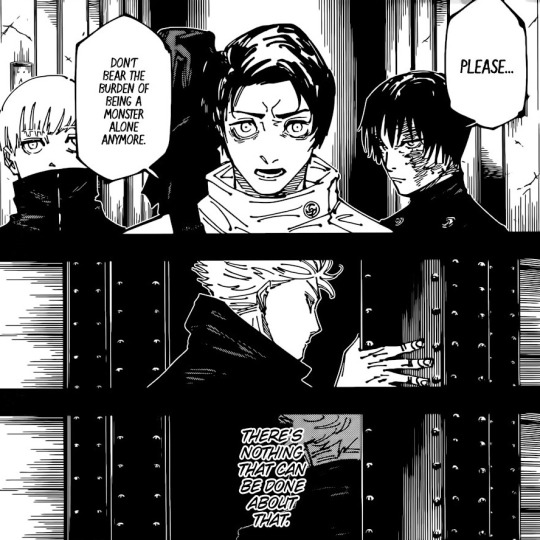
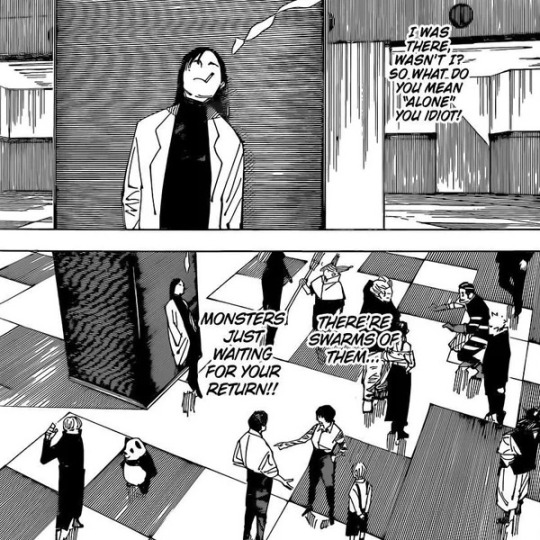
All of Gojo's actions are about preserving the humanity of others at the expense of his own. That's precisely why he chooses to become the "monster" alone. In this way, Gojo is flawed but he isn't uncaring. Again, it's a matter of perspective.
Gojo sees strength as the solution because it's all he's ever known. However, recognising the strength of others doesn't mean that's all he sees — because Gojo knows that dehumanisation acutely. What's more, 261 also suggests he thinks of "strength" in different terms to others.
When they meet, Gojo tells Megumi not to get left behind. However, he later says he was "left behind" when Geto defected. We know Gojo's physical strength eclipsed Geto's, yet Gojo only refers to himself as "the strongest" alone after Geto dies.
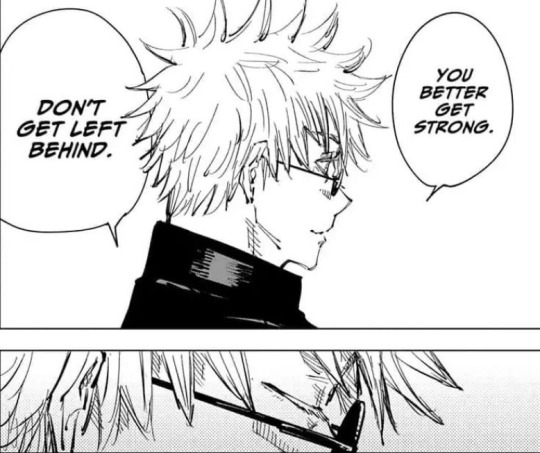
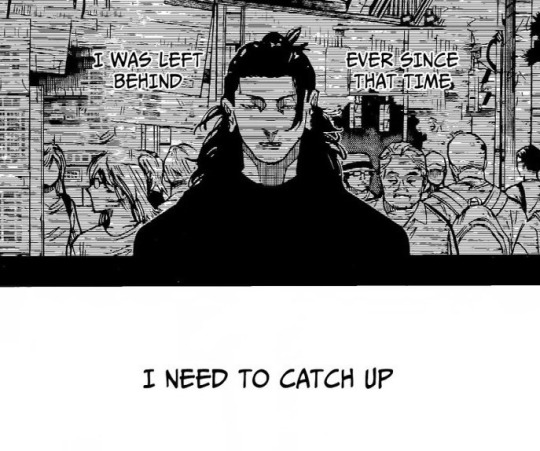
Before that point, there's nothing in the text to suggest that Gojo ever stopped thinking of the pair of them as "the strongest" — as a unit, as a duo. This suggests that strength, for Gojo, is something much more intangible, much more sympathetic, and much more human too.
What do the strongest characters in JJK all have in common? Indomitable will, courage in their convictions, an overwhelming sense of self. Looking at strength through this lens shines a new light on Gojo's goal of raising "strong" allies.
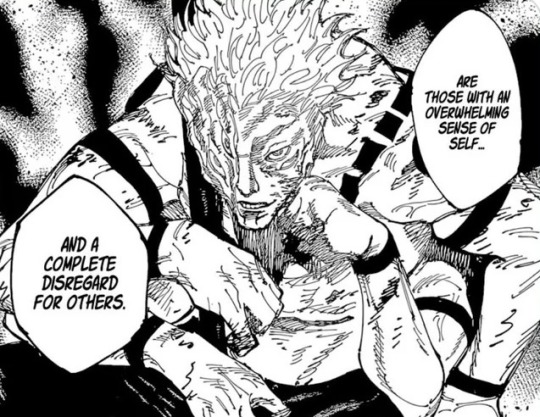
When he forces a third option in Shibuya, Gojo proves that strength doesn't have to come at the expense of compassion. In the later chapters of the Shinjuku Showdown arc, Yuta, Yuji, and the rest of Gojo's allies reinforce that idea ten times over, and I have every belief that Megumi will soon do the same.
To suggest Gojo only saved Megumi for his technique is unfair when he has consistently proven himself committed to protecting the futures of others, even "weak" non-sorcerers who have nothing to offer him. Once again, it's all a matter of perspective.
Gojo's way of caring is still caring, even if it doesn't look familiar to you. His only flaw was closing himself off from others and choosing to care from afar. However, just like Gojo never stopped reaching for Geto after he left, Gojo's allies never stopped reaching for him.
There's a phrase we use to describe looking at things from another perspective: putting yourself in someone else's shoes. I think it's very telling that Gojo's allies have taken that literally — Yuta by stepping into his skin, and Yuji by standing in his place in 266.
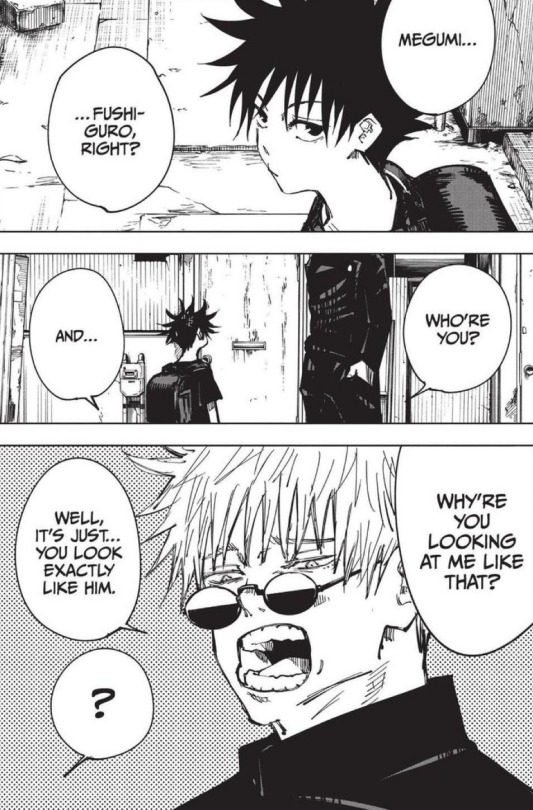
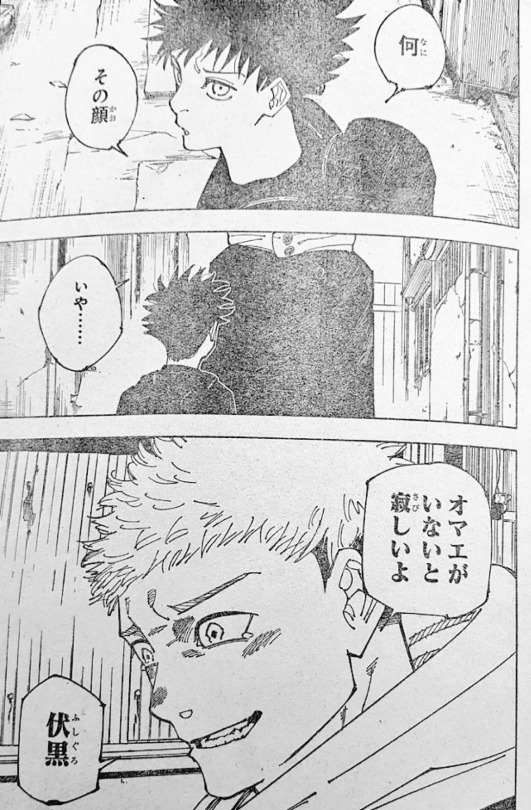
TL;DR: Gojo cares a lot, actually. If Gojo talking about his innermost feelings can't make you empathise, and the students he supposedly "doesn't care about" recognising his burdens can't make you empathise?
Well, that says far more about you than it does about him.
Come read my fics about this!
In His Shadow explores the ways Gojo keeps his distance from Megumi, who isn't equipped with the tools he needs to reach him but finds his own ways to show he cares, born from ten years of history together.
Rivers Crossed, Mountains Scaled explores Gojo and Megumi's relationship through the vehicle of SatoSugu — why Gojo took him in, whether Gojo really gave him a choice, how Gojo sees him.
Hope you enjoyed the post! I love you, Gege Akutami ♥️
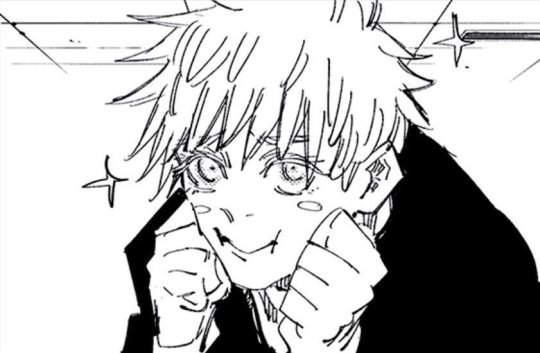
#jujutsu kaisen#jjk#jjk 266#呪術廻戦#gojo satoru#fushiguro megumi#jjk spoilers#jjk manga spoilers#jujutsu kaisen spoilers#jjk meta#jjk analysis#jujutsu kaisen meta#jujutsu kaisen analysis#glo's writing#glo's analysis#fushiglow
535 notes
·
View notes
Text
Why I Like Megumi's Character - an unnecessarily long explanation



I was initially drawn to his role in the show because I relate to him so much. He is incredibly judgmental, viewing people purely by their actions as we see below:
In season one he explains his motivation: "I hate bad people. They act so damn superior when their empathy and imagination are as empty as a vacant shell."
He immediately follows this with, "I can't deal with good people either because they forgive those bad people and they view the act of forgiveness as a noble thing. Makes me wanna vomit."
While I do not believe in the idea of "good" or "bad" people, I can agree with the sentiment that humans simply are what they do. There is no deeper "person" below the actions they take. I believe forgiveness is the only real way to move on from things, even so, I find it incredibly challenging to forgive those who have harmed others by their actions.
"The dog that weeps after it kills is no better than the dog that doesn’t." That is to say, your guilt will not purify you.
As I get older I have learned again and again that not everybody has the same moral expectations that you may hold for yourself, and if you expect goodness from others, you will undoubtedly be let down. Not matter how much goodness you give out.
Next, though her convictions upset him, Megumi loves his sister deeply.
Tsumiki is Megumi's example of a quintessential "good person", he dislikes her eagerness to forgive those who have done wrong, in fact, her compassion upsets him. Even so, he recognizes her as a person he greatly loves.
As someone who is blessed to be surrounded by kind-hearted people. I am, on occasion, revolted by the actions they let slide by those around them. Though I view their laissez-faire attitude as rather pathetic, I can still recognize they are a better person than I.
Megumi does not try to be like anyone but himself. Though he disagrees with Yuuji, he still recognizes the goodness in him and I believe that at times, he wishes to be more like the other boy.
#jujutsu kaisen#megumi fushiguro#jjk megumi#jjk analysis#jujutsu kaisen analysis#jujutsu megumi#jujutsu kaisen megumi#jjk fluff#jujutsu kaisen fluff#megumi fluff#megumi imagine#megumi headcanons#megumi x reader#megumi x you#megumi x y/n#megumi comfort#jujutsu kaisen theory#jujutsu kaisen x reader#jujutsu kaisen imagines#retiredteabagrantsandrambles
196 notes
·
View notes
Text
JJK 265: The Role of a Sorcerer
one of the focal points of jjk since the beginning has been the roles and responsibilities of jujutsu sorcerers. it's a question that gets thrown around a lot between different characters: as sorcerers, what is the right way to live? it's a driving force behind many of the major events of the story, and the cause of fragmentation, where different paths could have been taken, but weren't. and in one chapter, yuuji dismantles it all.
as much as i'd love to talk about this when it comes to every character, i picked a few that i think are interesting (to me) and carry a lot of weight throughout the story to discuss, including gojo & geto, megumi, yuuta, and, of course, the man of the hour, yuuji.
Gojo & Geto
the main difference between them right from the start is the way they view their roles as sorcerers, and this fragmentation influences their trajectories going forward, and the trajectory of jjk as a whole.
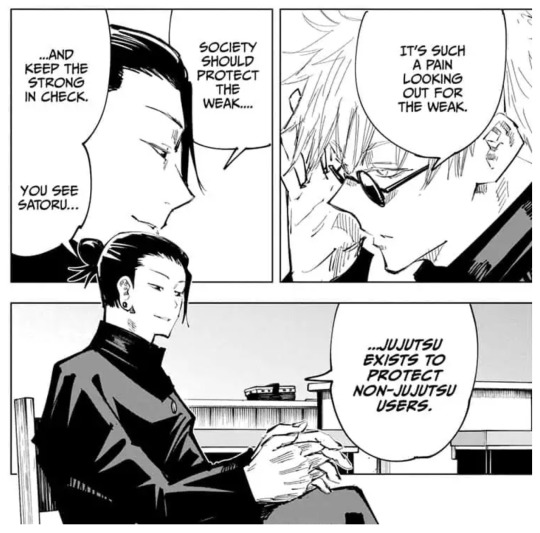
at the start, geto believes that his role as a sorcerer is to protect non-jujutsu sorcerers. as someone who is strong, he must protect those who are weak, and he must keep those who are also strong in check. he accepts this as his role without much question, and he takes it seriously.
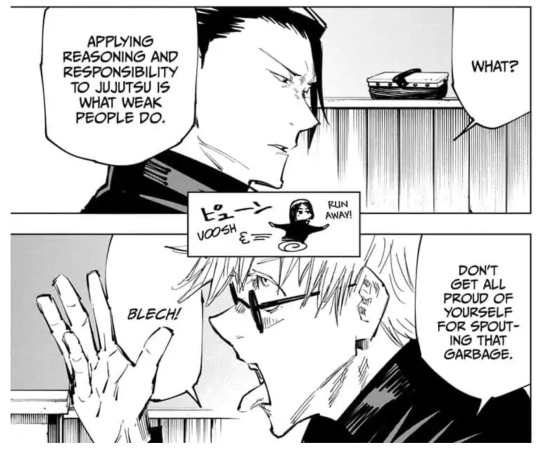
in contrast, gojo thinks that idea is, well, garbage, and he argues with geto about it, calling him self-righteous for thinking that way. where geto focuses his concept of his role on those who are weak, gojo focuses his on those who are strong. his role is simply to be strong. he acts to get stronger and prove that strength.
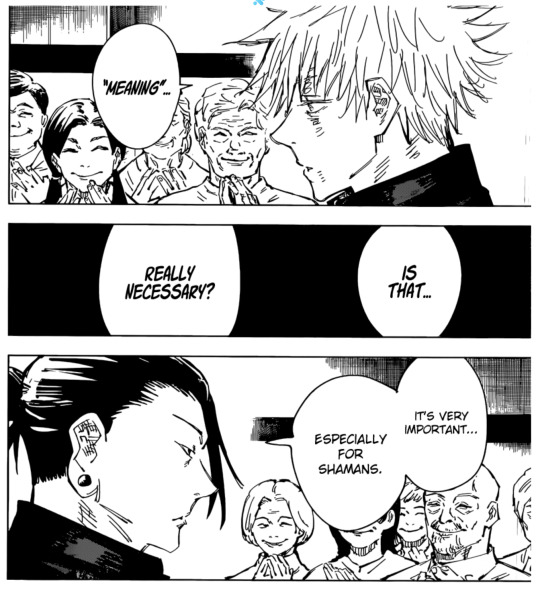
another place where their opinions diverge in conceptualizing their roles as sorcerers is when it comes to finding meaning in their actions. where gojo doesn't think there needs to be meaning in their actions, geto disagrees.

ultimately, his search for meaning leads to his downfall, as he reaches the conclusion that being a sorcerer is a thankless job, cleaning up after and saving the humans from their uncontrolled cursed energy. he decides that sorcerers are the ones who need protection from humans, because they are subjected to the horrors that humans generate, while those humans live in ignorance.
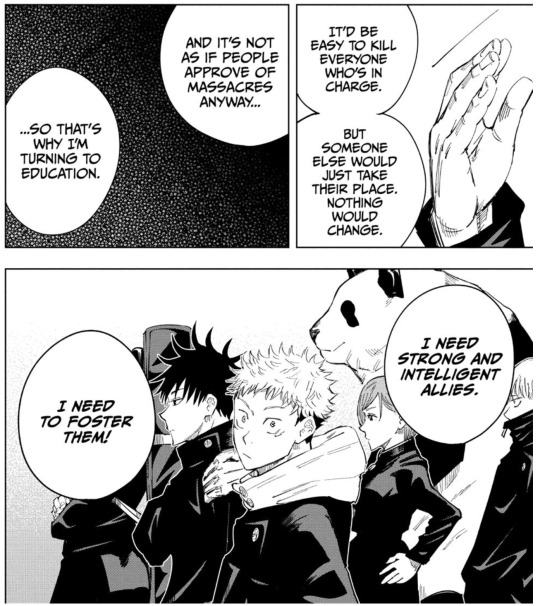
meanwhile, as gojo matures, he doesn't ditch the idea that strength is what matters as a sorcerer, but he shifts his idea of role to raising a generation of strong sorcerers who can rely on each other. and ultimately, these leads to his downfall too. thoughts on this here under point 1.
regardless, their ideas of their roles are major driving factors of their decisions, and therefore the plot of jjk. their roles are what doom them to their respective fates.
Megumi


megumi has made damn sure we know what he believes his role is. he's a sorcerer, not a hero. he doesn't save people because he has to or because it's the right to do. he saves the people he wants to save. that's all.

he uses his conscience to decide who he wants to save, and that is his decided role.
and this is what dooms him too. his decision to save yuuji is what left him vulnerable to sukuna, and his desire to save tsumiki from the culling games left him open to be manipulated by yorozu, as she pretended to be his sister in order to take advantage of what megumi was willing to do so she could play her own version of the culling games. that shock and hurt is what let sukuna latch onto him so easily, and submerge his soul in the depths of his body.
Yuuta
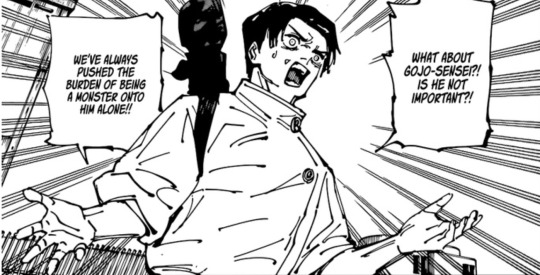
yuuta decides that his role is to not let others be alone. of course, this is most notable when it comes to gojo, but it's shown throughout jjk0 as well, such as when he refuses to let inumaki go against the curse that geto planted alone.
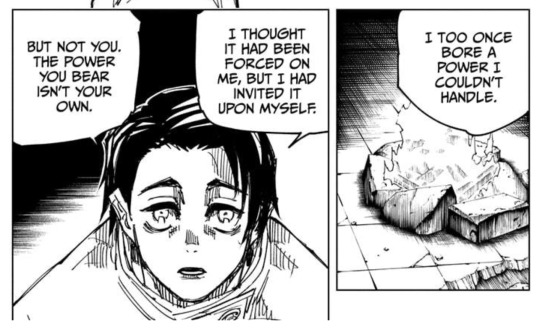
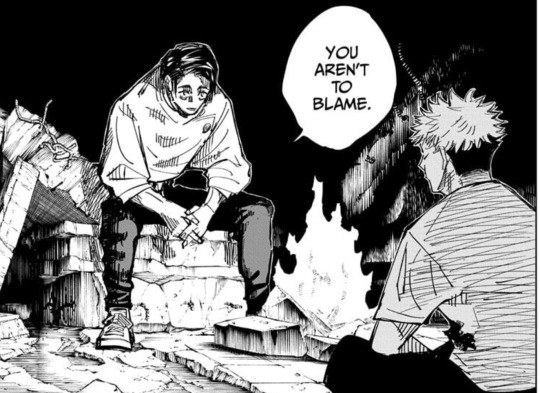
he also expresses this to yuuji after he fake executes him. he makes sure yuuji knows that he isn't alone in his feelings, and that he's not to blame. empathy is one of yuuta's strongest traits, and he makes it his role.
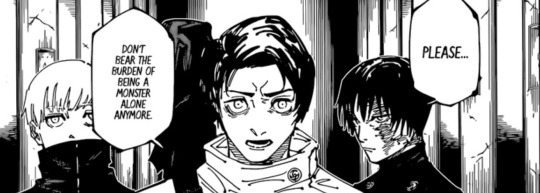
this is why he is willing to go as far as taking gojo's body, because he knows how gojo has to toss aside his humanity to fight all of these special grade curses (for example, when he used his domain expansions while humans were around despite knowing it would cause damage to them), and he doesn't want him to be alone in his inhumanity.
and while yuuta isn't dead yet, his role has doomed him, because, well...
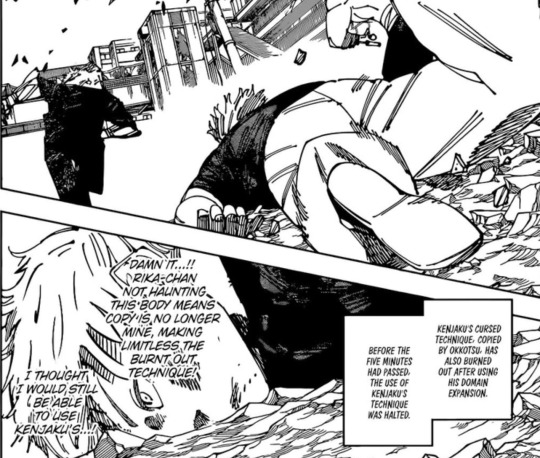
Yuuji
now we come to yuuji, the sorcerer who shakes this concept to its core in jjk 265.
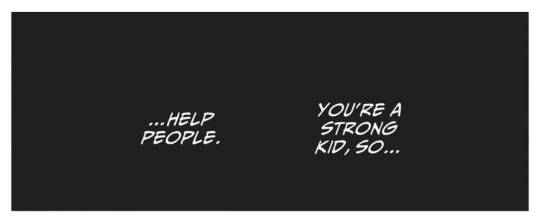
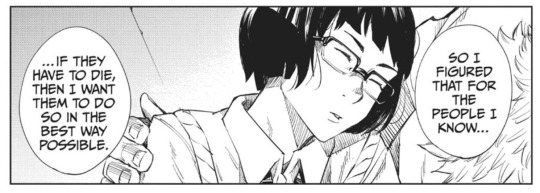
he's someone who'd decided his role before he even became a sorcerer. he wants to help people, and he wants to guide them to proper deaths.
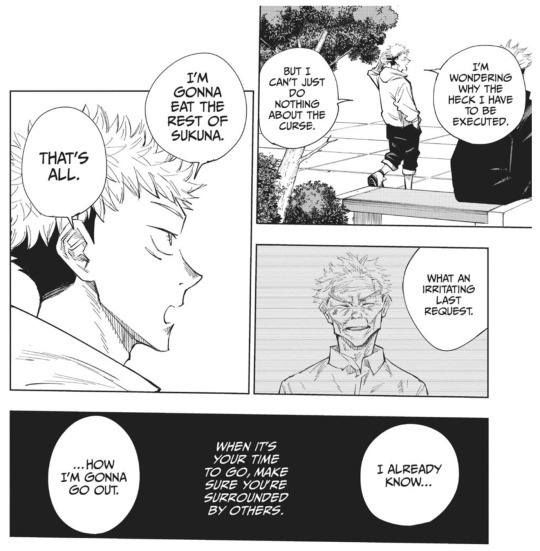
he also accpets his role as sukuna's vessel, and tries to maintain those two parts of his chosen role simultaneously. however, as we know, he fails to balance being sukuna's vessel and saving people in shibuya (i hesitate to use the word fail because it was not a failure of yuuji's, but i hope you know what i mean).

this causes a shift in his idea of his role, especially once megumi asks for his help in the culling games. he embraces this role as a cog. he will help out fushiguro, he'll help unseal gojo, and then he will die. that is his new role.
quote from yuuji in 265:
until recently, i thought i should simply live to fulfill my role as i understood it. i thought if i died like that, i could at least consider it a proper death. but now, i feel like that's not entirely right. ... just the tiny fragments of memories that make up a person drifting elsewhere give value to a human life. ... people aren't tools. we aren't born with any set roles
yuuji completely rejects the idea that people are defined by theid roles at all, whether they are jujutsu sorcerers or not. he sheds his mindset that he needs to help people, or give them proper deaths, or fulfill a role than die in order to be worth something. instead, he accepts the value of his life as a collection of all the things he's experienced and the people he’s known.
and in doing this, he shakes the world of jujutsu kaisen to its core, and creates another crack in the cycle.
#um i wrote this at 2am sorry if it makes no sense#half awake me thought they were cooking#but yeah#i've always thought about this idea#especially since 261#and im SO happy to see yuuji finding meaning in his life#damn this got long#jujutsu kaisen#jjk#jjk spoilers#jjk leaks#jjk 265#jjk meta#jjk analysis#gojo satoru#geto suguru#megumi fushiguro#fushiguro megumi#okkotsu yuuta#yuta okkotsu#yuji itadori#itadori yuuji
371 notes
·
View notes
Text
JJK 271: The death of Ryomen Sukuna
As a Sukuna fan, this chapter was everything I could ask for. Such a beautiful end for such an interesting antagonist. Okay coming back to the chapter, more specifically to Sukuna and Mahito conversation, we see Sukuna admitting that he had different paths he could have travelled, two to be more precise: one being with Uraume and one with a mysterious black hair figure who is dressed as a shrine maiden, so the question here is who is this mystery person...it's definitely not Yorozu since Yorozu has never dressed this modestly and I don't think this is Sukuna's mom either...so who is this???
I believe this is Kenjaku when he first approached Sukuna in the Heian era.

We previously had a panel of Sukuna's mummified body dressed as a monk by Tengen in the manga...so Sukuna might have grown up in a religious setting, and what better way to get close to him than approaching him as a miko or a shrine maiden.

But that's beside the point. The point here is Sukuna talking about the two paths he could have chosen, and he ends up choosing Kenjaku. He allows Kenjaku to make him as a curse object, allows Kenjaku to make a vessel for him to reside into, allows Kenjaku to rope him into the culling games, and even allows Kenjaku to trust him with Tengen and the merger. But the sukuna who chose this path was an angry version of him, the curse version of him if you will. He wanted to spit back the curses that were residing him, so full of anger anger anger hate hate hate. Even at his death bed his only response to kindness was "don't underestimate me, I'm a curse". So this version of Sukuna choosing Kenjaku over Uraume was no surprise.
But what changed then????....well.....HE LOST
He lost, not to Gojo or Yuta or Yuji or the serveral dozen sorcerers who jumped him, in the end he lost to MEGUMI FUSHIGURO. In ch 268 we see Sukuna trying to manipulate Megumi to give him all the control, to give up and leave it to him.


This curse version of Sukuna who doesn't know anything except cursing others back, recounting all the deaths Megumi caused to him, telling Megumi how he can't live a proper life anymore....somehow somewhere it feels like he is trying to delude himself too by saying after all the atrocities he caused in 1000 years there is no use fighting back, no use in living a proper life anymore. And this Sukuna has never lived for anyone except himself so it's easier to curse the world back, easier to give up all the control and just cause panic and doom and death.
But Megumi is not just living for himself, he lives for Tsumiki, for Yuuji, he can't doom the entire world when the world has people like Tsumiki and Yuuji in it and so he fights, he refutes the notion of proper life and says he wanna try living for someone else one more time.

All this could not have been done without Yuuji Itadori of course, Yuuji Itadori who came as a guardian angel to Megumi Fushiguro, who never gave up on Megumi once, who showed Megumi how to live one more time.

Not only that Yuuji Itadori showed Sukuna, the king of curses, the one person who kept cursing and ruining his life again and again, pity. Yuuji who was cursed by several people in his life, his grandpa, Nanami, Junpei, Mahito, Gojo, Choso, Nobara and Sukuna himself, still able to live his life without cursing others back, still able to live his life with compassion. And Sukuna reaction to it is understandable: rage. Because Yuuji is everything that his chosen path won't let him be, Yuuji is everything that that Sukuna could have been if only he hadn't chosen the path with Kenjaku...if only...



So after Sukuna who has lost everything and there is nothing more for him to lose, he decides to choose a different path, he chooses Uraume. And just like Megumi who decides to live for someone else (Yuuji) when given the second chance, Sukuna chooses to live for Uraume this time. He acknowledges his defeat with grace, does not condemn the path he chose the first time but instead he is regretful which is so raw and unfiltered coming from Sukuna, and moves on North this time with Uraume. This time Sukuna chooses Uraume instead of Uraume choosing Sukuna and serving him.

And with this the story of Ryomen Sukuna comes to an end. We never got his backstory, we never even got his real name because he never looked back behind him to acknowledge those measly things. To say in short, this is the death of the King of Curses who was just living to cause death and destruction around him and rebirth of someone entirely new.
#WE LOVE YOU RYOMEN SUKUNA I SAY IN THE MIC#jjk#jujutsu kaisen#ryomen sukuna#sukuna#uraume#jjk 271#jjk leaks#jjk spoilers#jjk manga spoilers#won't say anything about sukume relation#it can be anything#but i personally see this as a guardian and a lost kid relation#just like geto and nanako & mimiko#the way uraume is so loyal to sukuna is the same way nanako and mimiko are so loyal to geto#but just like i said can be anything else#jjk meta#jjk meta analysis#jjk271#itadori yuuji#yuji itadori#megumi fushiguro
206 notes
·
View notes
Text
looking at this panel again made me realize what megumi says here has more implications about him other than his sexuality or preferences. it's about how he views his wants vs. his needs.

Todo asks him about his type. Usually when someone is asked that, they answer with their preference, what they *want*, or *prefer*, like for example Yuuji's answer of a "tall girls with big butts", despite having a history before of not prioritising that like when he liked yuko.


But Megumi answers, not of what he prefers or what he finds attractive (whether physically or personality-wise), he just says what he *needs*. He doesn't have a preference as long as the person's character is unshakable. That's it. That's why Todo found his answer boring.

it's not just because he described a character trait or personality rather than a physical attribute like Todo & Yuuji, but because it was the bare minimum. When you ask someone their type, if they reply "someone with a stable career" you'd find it a bit boring, no? it's not really answering your question of what they want in a partner, what they desire. just what they need. This approach of only looking at what is needed persists through everything Megumi does, not just his type, specifically his career a sorcerer.
He doesn't take more than what he's given, and he forces himself to provide what the situation needs. For example, his sacrifice bunt in the baseball game that Gojo called him out for. He didn't think about what he wanted, but what was needed for the match, and that was to let Nobara advance while he stays behind, so that they overall win the match.

He limits himself like that. That's why Gojo's words of "It's okay to be selfish!" resonated. Because he never let himself take more. He never let himself step out of line.
This goes for his relationship with Gojo, too. he was a teacher, a mentor for him, but he never let himself step out of line to get any closer to him, as opposed to someone like Yuuji or Yuuta who interact with Gojo freely without any barriers between them. To him, he needs Gojo as a mentor and nothing else, and never let himself entertain the idea of wanting to be closer to him. throughout the conversations and interactions between Megumi and Gojo, there is a sense of distance that not even Gojo has with Yuuta and Yuuji, despite the barriers Gojo put up. Yuuji and Yuuta are both close to Gojo in the sense that they let themselves depend on Gojo and express themselves freely, able to talk about things other than jujutsu. but there isn't anything like that with Megumi. he always speaks to him formally despite 10 years of knowing each other and he's never spoke to him about anything other than jujutsu. to Megumi, Gojo is a teacher and mentor strictly and nothing else. not an adult he could depend on or someone he could confide in.
This goes for Toji, too. To him, he thinks doesn't need his father because he left him, that's why he doesn't care. even if he wanted to grow up with a stable caretaker in his life.
When Gojo first provided him with the two "choices" of training under him or being with the Zenin clan, he didn't think to ask if there was a third option where he just doesn't become a sorcerer. obviously this is because when you're like 6 years old and you're provided with two options, you don't think to entertain a third secret option, especially when you're talking to someone you don't even know, but this mindset of just taking what life gives you without question or defiance is largely why megumi didn't really thrive, especially in such a selfish environment like jujutsu sorcery where you need to overstep to succeed. only when he let go of those limitations (CH. 58) was he able to take selfishly.
His dream in 266 tells you this in full clarity. what he wanted was a simple and domestic life away from jujutsu sorcery. but he knew he didn't have the authority to really demand that from gojo, so he settled for what he needed, which was his sister's happiness.
this attitude of his likely resulted from the fact he grew up having everything taken away from him (his mother, his father, and even his stepmother) along with the fact that he grew up in poverty, so he didn't feel like he had any sort of authority to want things. he saw it as a luxury he wasn't allowed.
(interesting that the only time he has expressed a want, went against life and actually stepped out of line and made a decision out of a selfish need, is when he wanted to save yuuji.)

#fushiguro megumi#jjk analysis#cross posted from twitter#i was gonna leave it there but realized tumblr deserves to see this too#itafushi#sorta#in the end anyway
150 notes
·
View notes
Text
JJK’s god forsaken fandom has done lots of characters dirty. Whether it be downplaying Nobara’s backstory, some calling Maki a “Toji copy,” you get it. However literally no other JJK character has been done as dirty or bad in the fandom than Megumi:
His trauma and his damn FATHER leaving him gets downplayed by the fandom, saying how “he said he didn’t care.”
He gets called bland, yet if his insecurities are explored along with his inferiority complex it either gets ignored or he STILL gets slandered.
When he is appreciated he either gets sexualized or watered down to his long eyelashes.
Good fights that show his INCREDIBLE smartness along with fighting the curse, Reggie, Kirara, etc get ignored or get credibility taken away.
The scene where he literally gets Yuji back up at the campfire is ALSO ignored. (Without Megumi or Todo Itadori would’ve given up. It’s no debate.)
Gets sexism from toxic masculine wannabe “alpha” boys who are butthurt he isn’t your typical “cool powerful badass.”
(MANGA SPOILERS) His body when taken over by Sukuna gets touched inappropriately by Yorozu, which can practically count as SA. However literally NOBODY notices this.
His dynamic with Tsumiki and how much he cares for her is undermined.
Literally almost all scenes that show his mind and depth gets undermined.
Some people say his backstory “wasn’t that bad” just because he had Gojo take him in. ☠️
He gets victim blamed for what happened with Sukuna in the manga.
(MANGA SPOILERS) He gets blamed for being depressed and giving up when his LITERAL REASON for becoming a Jujutsu sorcerer and living is gone, along with his body being used to kill his own mentor and taking billions of hits.
There’s literally so much more but I’ll stop there. The way Megumi aka a literal TEENAGER is treated in this god awful fandom is actually so disgusting, and reeks of major apologism along with victim blaming. It’s sad because Megumi is easily VERY well written and complex. He just had to be in this illiterate fandom. Seriously, f this fandom. 😭
#I feel like jjk cast has amazing writing but some are just downplayed due to the fandom#if they were in another fandom MAYBE just MAYBE they’d be even more acknowledged#how tf will you call a literal 15 year old traumatized kid useless when he is literally one of the people that made itadori get back up#this fandom is exhausting#fandom problems#jujutsu kaisen fandom#jujutsu kaisen#jjk#analysis#meta#my analysis#just my thoughts#fushiguro megumi#megumi fushiguro#megumi#megumi defense squad
394 notes
·
View notes
Text
you know when they say that the teachers who did nothing in class and made us learn everything by ourselves where the only type of teachers who prepared us for real life and college? i think the same applies to student sorcerers. the kyoto students had better grades and where more advanced inside the classroom. meanwhile gojo's students, who had lower grades had more experience in battle. gojo was the type of teacher who would throw his students in an abandoned building and be like 'if you get out of there alive you pass', didn't explain anything and made his students find out everything by themselves, and although the poor kids were going through the trenches, later on when they were actually face to face with real unsupervised threatening situations, they showed more control and experience than the kyoto students
#jujutsu kaisen#jujutsu sorcerer#jjk#jjk analysis#jjk anime#jjk manga#jjk gojo#jjk satoru#gojo satoru#jjk yuji#jjk nobara#jjk megumi#yuji itadori#jjk itadori#jjk fushiguro#jjk kugisaki#megumi fushiguro#nobara kugisaki#yuta okkotsu#maki zenin#toge inumaki#jjk yuta#jjk maki#jjk panda#jjk toge#jjk inumaki#jjk okkotsu#mai zenin#shibuya arc#utahime iori
196 notes
·
View notes
Text
bro gojo was so unserious that he didn't even say ごめん (gomen - sorry)
he said めんご (mengo)
but can we also talk about the word gojo uses for "father"
he uses 父親 chichioya which is a general societal term for father meaning he attaches no politeness or feelings towards the word. basically saying "person you would call your dad since he technically made you"**
**edit : user @/iliketobrowse has given a more in depth and accurate translation for chichioya in the reblogs! my current wording attaches a negative connotation while its usually a neutral term like a title of "father." sincerest apologies for my misinterpretation, that was completely my mistake! i will do better as to not make this mistake again. thank you so much! ♥️

is this the gyaru talk gege was talking about 😭*
* it's come to my attention that gojo's gyaru talk may not have come from gege. idk enough about the jpn language/culture to confirm or deny if gojo always talks cute/like a gyaru. im just actively learning japanese and i make posts like this to share the cool things that get lost in translation - thank you!
i do not claim to be a translator - lost in translation disclaimer
#jjk#jujutsu kaisen#jujutsu kaisen spoilers#jjk spoilers#jjk 268#gojo satoru#gojo#satoru#fushiguro megumi#megumi fushiguro#jjk leaks#jjk analysis#thoughtssvt's lost in translation
4K notes
·
View notes
Text
Understanding Tsumiki and Megumi's relationship
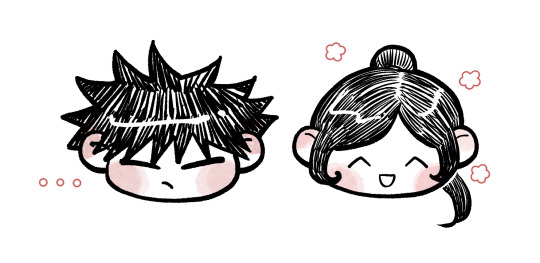
Hey there! It's me, Megumi's defense attorney - here once more to defend my boy.
I've been seeing A LOT of people saying they cannot sympathize with Megumi's grief because they don't know Tsumiki that well. And although I would argue that you don't need to know the person who died for you to sympathize with the one who was left behind - I do understand what these people mean, i don't agree with them! But I understand why they think this. And yes, we dont know Tsumiki.
However, we first need to understand why gege chose to present Tsumiki this way. On a surface level, she can only be seen as 'the thing that would cause Megumi's downfall' - we dont know her thoughts, her ambitions, her real personality, anything really - except for what Megumi says about her. A 'textbook good person'.
And that's because she is a character that we were only able to see through someone else's eyes. We don't know Tsumiki, because Megumi doesn't know Tsumiki.

BUT WAIT!! What do I mean by that?
Before that though, I would like to say first! This doesn't mean that Megumi's love for her is diminished by this. Just because he doesn't know her doesn't mean he doesn't love her. Megumi cares about her more than anyone in his life, and that's a fact!
Now we can proceed! What does this mean? Let's look at this page from ch 56: origin of obedience:
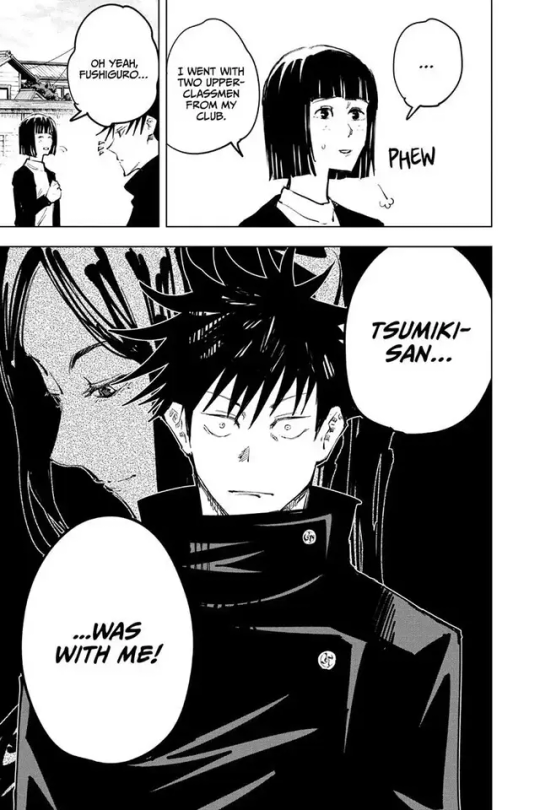
This was a case that they have been investigating, and it is pretty damn close to Megumi's and Tsumiki's old school. And yet, the thought that Tsumiki might have went to the bridge with her classmates never crossed his mind. He doesnt know that Tsumiki is someone capable of breaking the rules, going against curfew, and joining her friends to go to a haunted bridge in the dead of night. This boy Megumi thinks his sister is a damn saint.
He put Tsumiki on a pedestal, and it resulted in her turning into nothing but the mold of a good person Megumi uses to judge other people. If a person is not Tsumiki-shaped, then they're not worth saving. ((Luckily for Yuuji, he IS Tsumiki-shaped lmao. But anyway!))
Truth be told, I used to think it sucks that we never knew Tsumiki outside of what Megumi says. I never felt bad when she died, I felt bad that Megumi's sister died. I felt bad FOR Megumi.
And now that I actually think on it, THAT was the exact point. We dont NEED to know Tsumiki, we only needed to see her through Megumi's eyes - and through that, understand that Megumi doesn't really know her that well.
It is something that Megumi have to mull over. Why did he keep Tsumiki at an arm's length despite how much he cares for her? Why is it so hard for him to let people in? Why is asking someone for help so difficult for him?
ITS BECAUSE OF THAT MFKER TOJI!!!! IM TELLING YA'LL!! /hj
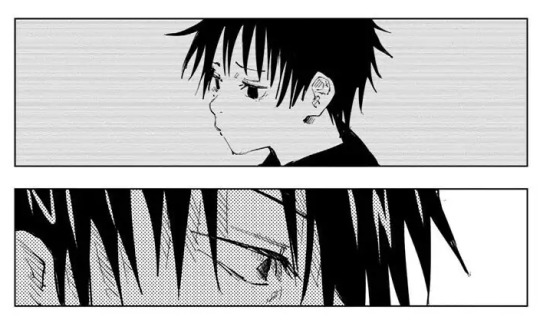
Look at the face he was making in Toji's memory. That's a kid who shows his emotions outright. My boy is pouting (つ╥﹏╥)つ. But when Gojo met him, Megumi has become a total idgafker (at least on the outside). And thats not only because Gojo was a stranger - coz thats how he looks like when he talks to Tsumiki too. It's because he became that way when Toji left.
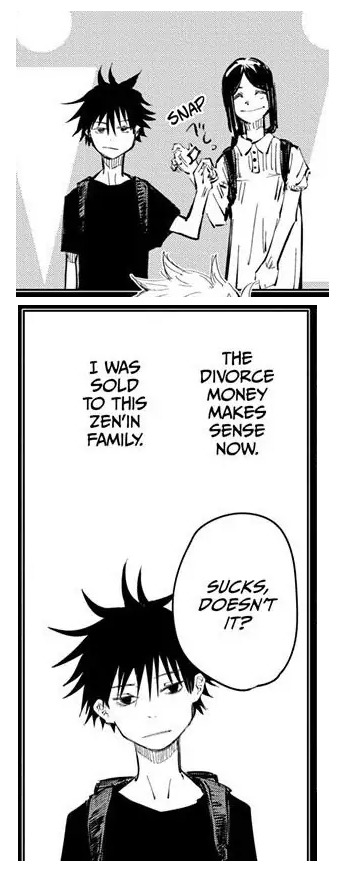
Anyway, my point is, due to Megumi's abandonment issues - he never let anyone in. EVER. Not even Tsumiki. Megumi put a wall between him and other people - for his own protection. The one who came a little bit close into breaking that wall is Yuuji (and we are yet to see how that goes).
And this is why, we as the readers are all detached from Tsumiki's character. Because we saw her through Megumi's eyes, who loves her and cares about her very, very much - yet despite that he never let her get too close. (っ- ‸ - ς)
If you read up to here, whats up! Thank you for reading! Feel free to counter it or anything, Im happy to discuss!
((also something to add: Megumi cares so much about Tsumiki because she's the first one who actively chose to stay - amidst all the people who left.
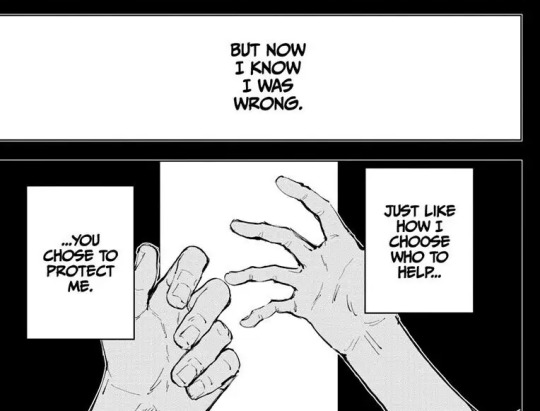
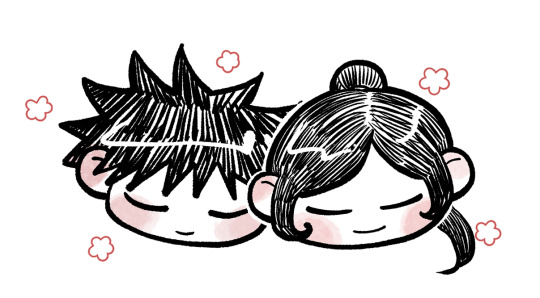
this was inspired by a great megumi character analysis i found on twitter:
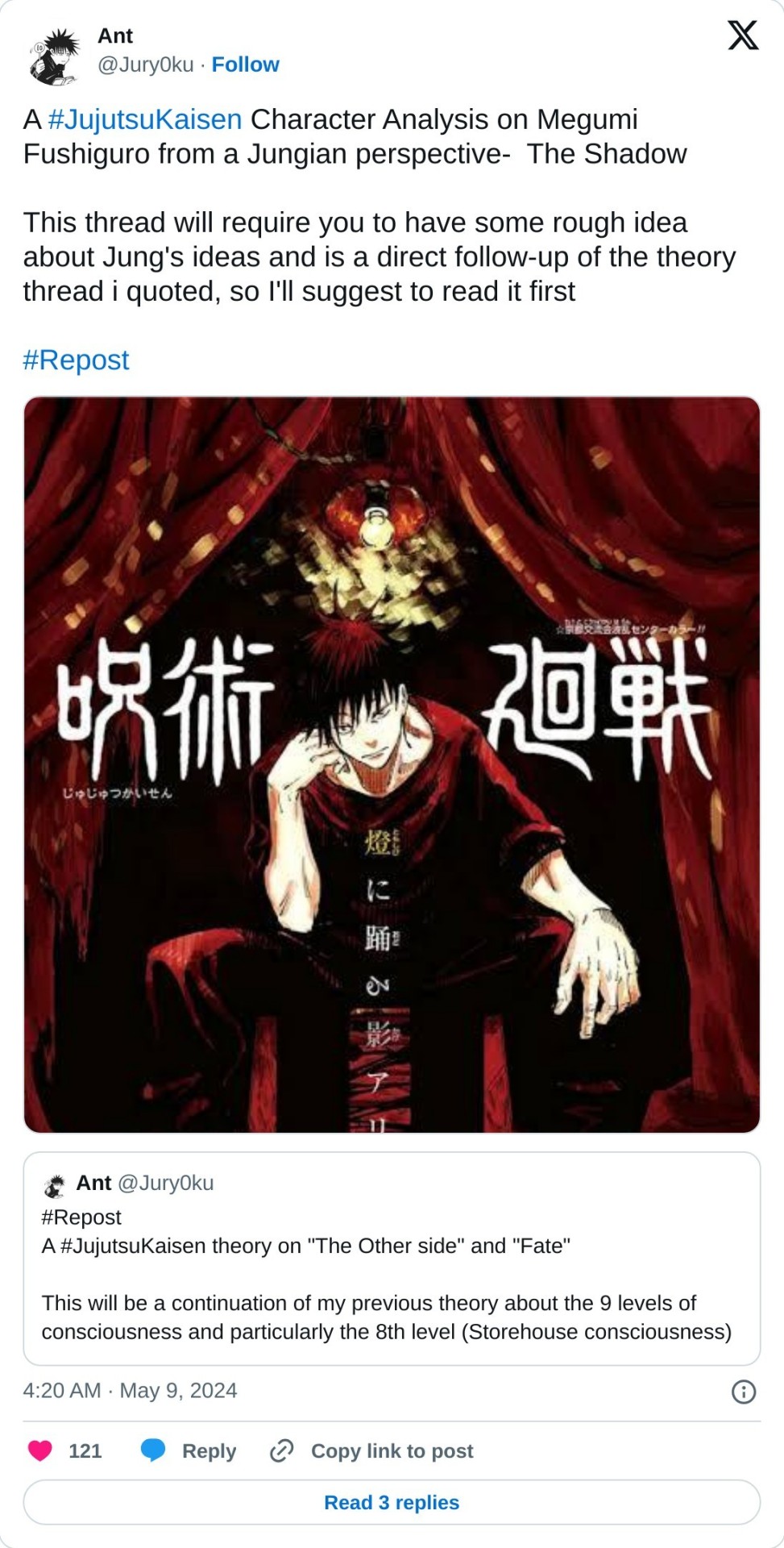
read it if you have time! its really good!
#jujutsu kaisen#megumi fushiguro#jjk#jujutsu megumi#fushiguro tsumiki#megumi and tsumiki#megumi#tsumiki#jjk rant#jjk ramblings#jjk rambles#megumi and tsumiki character analysis#jjk character analysis#i miss megumi
292 notes
·
View notes
Text
i know many people are complaining about megumi '"living for someone else" instead of himself part but you've got to understand that there is no right or wrong way to get over depression, it effects different people differently. while i would've loved seeing megumi get his revenge and be a total badass but i also understand this plot choice. one doesn't cure their mental health and go on to conquer it's cause immediately, so i get it.
this is his first step towards himself because while he phrased the choice as "to live for someone else" he did have to choose to not give up on himself to get here. this is only the beginning, he will get there, he is still recovering from all the trauma but slowly and surely he will learn to live for himself, give it time.
#of course i don't expect gege to be able to show that much depth and recovery in 3 chapters but i don't hate him either for this choice#it's not the superhero part of main cast moment you'd like but it's reasonable#jujutsu kaisen#jjk#jjk spoilers#megumi fushiguro#jjk leaks#jjk 268#jjk manga#jjk manga spoilers#jjk megumi#jjk analysis#jjk meta#200
257 notes
·
View notes
Text
On "It'll be lonely without you" in 266
Gojo says 一人は寂しいよ to Yuta, but only 寂しいよ, an expression of loneliness, is present here.


However, Yuji uses the close pronoun お前 and Gege uses katakana オマエ to emphasise it. Where else has he done that exact same thing? 😭

I believe 寂しいよ could also be interpreted as "I'll miss you" which are definitely the kind of "embarrassing words" Geto might have been referring to here. It also fits the "three words in English" criteria.

Either way, the parallels are paralleling.
#jujutsu kaisen#jjk#jjk 266#呪術廻戦#fushiguro megumi#itadori yuuji#itafushi#gojo satoru#geto suguru#satosugu#jjk spoilers#jjk manga spoilers#jujutsu kaisen spoilers#jjk meta#jjk analysis#jujutsu kaisen meta#jujutsu kaisen analysis#glo's writing#glo's analysis#fushiglow
393 notes
·
View notes
Text
I love the order of these panels. You have Yuji looking down at Megumi with a smile telling him to live a long life and Megumi looking up at him struggling to hold back his tears. It’s such a beautiful choice gege decided to make.

#saturnscherie#itafushi#itfs#yuji x megumi#jjk yuji#jjk megumi#yuji itadori#megumi fushiguro#jjk#jujutsu kaisen#itafushi analysis#tears in my itafushi eyes#looking back at the moments between Yuji and Megumi you can always notice something new
83 notes
·
View notes
Text
megumi and mahoraga: understanding megumi’s strategy & dismantling the jokes
i think one of the biggest misconceptions about megumi’s character is that he is a trigger happy loose cannon that is willing to throw his life away at any inconvenience. so for this post, i want to help in understanding the strategy in which megumi employs what he thinks for most of the story is his “ace in the hole,” his secret weapon that will ensure his victory, even if it comes with his death.
mostly, i’m just sick of the mahoraga jokes, and megumi being the butt of 85% of the jokes in this fandom in general, as well as the bum allegations, etc. megumi is not as weak or as reckless as a lot of people think, and i will have more to say about this soon🤞
in order to do this, i’ll be unpacking each time he allegedly attempted to summon mahoraga, including some false allegations as well.
against potential sukuna in ch1

at this point, megumi is unsure of a lot of things. he’s unsure of if he’s talking to yuuji or sukuna. he’s unsure of how powerful sukuna, the legendary king of curses, truly is. he’s unsure of how yuuji or sukuna will react to him attempting to kill them. he’s already seen how strong yuuji is without sukuna, so it’s reasonable (and correct) to assume that with sukuna’s power, he could easily take out megumi and all of his shikigami easily.
another thing to consider is that megumi is seriously injured, and likely concussed, which would impact his ability to maintain and control his shikigami. already, he’s been unable to summon nue, and his divine dogs have disappeared.
in a case where he is up against a special grade(+) curse with unknown power just in a single finger, and he is injured and unable to maintain his other shikigami, he pulls out his secret weapon because he doesn’t want to be responsible for sukuna going rampant in sendai, so even if he dies, he’ll have trapped sukuna in this ritual that would likely kill him too.
against sukuna (again) in ch9

sukuna is now 3x as strong as he was the first time megumi encountered him, and megumi has attempted to fight him both with his fists and his shikigami. he knows that his severely overpowered. he was already pushed to his limit by saving kugisaki as well. he’s lost two of his shikigami in one day, and nue is at its limit, he notes.
he knows there’s not much more he can do, but he still needs to stop sukuna because, again, he needs to take responsibility for both itadori eating the finger and saving his life. the only thing he has left is mahoraga. again, it makes perfect sense. he has no remaining options, but he knows what must be done.
the next three are played up in the anime, but in the manga, it’s more vague. i won’t spend much time on them because it’s purely speculative.
(alleged) against todo in ch17

this never happened, and while it was played up like he was going to in the anime, i just don’t get why. he would never have summoned mahoraga against todo. megumi is a cautious fighter and does only what’s necessary, saving and building his energy as necessary (this is a different post). he also is trying to avoid conflict as much as possible in this scene, so there’s no reason why he would summon mahoraga here.
(alleged) against hanami in ch46 & ch47
something else that i think was more clear in the anime, but vague in the manga.

in ch46, his hands are near the position, and he is thinking about how much stronger hanami is compared to inumaki, arguably the strongest (or at least rated highest) out of the three sorcerers there (megumi, inumaki, and kamo). it’s possible that he was about to summon mahoraga, but again, he realizes at this point that he’s severely overpowered. kamo has gone down. he thinks that inumaki is finished too. it’s just him and this curse he can’t hold a candle too. he figures if he’s going to die anyway, that he might as well try to take hanami out with him.

this thought process is developed more in ch47. he says he needs to use “everything he’s got” because “it’s inexcusable that he be the first to go down.” he’s concerned about his burden and responsibility, and doesn’t want to be the reason why more people get hurt. so since hanami’s curse will already kill him if he uses more jujutsu, he refuses to be the only one who goes down.
against the finger-bearer in ch58
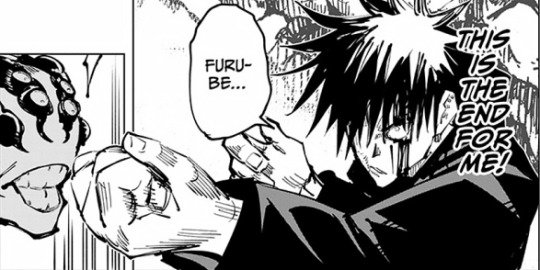
again, it’s a similar situation to others that he’s been in. he’s cornered, severely injured, overpowered, and his shikigami are not holding up as a match against the finger bearer. he even thinks ahead of summoning mahoraga that he might die.
plus, it’s more serious than “if i’m going to die, i’m taking you with me.” it’s tsumiki who’s at stake, as well as kugisaki and itadori, who are nearby. he needs this curse to be exorcized. ultimately, he chooses to use his domain expansion for the first time instead.
against toji in ch113

he only briefly considers it (or so it seems). but one thing the anime does a horrible job of showing is that megumi is nearly burnt out of cursed energy, mainly from holding his domain in dagon’s domain (understandable, considering that’s such an impressive feat. he held it for a long time too). he’s also injured, so much so that he’s saying he’ll need to go to shoko if he can get away, which brings me into The Mahoraga Summoning.
against haruta in ch117

every time i see people talk about this, it’s always “why did he pull out mahoraga against this nobody?” i mean, it’s exactly the reasons i just mentioned. after fighting toji, he’s nearly completely burnt out of energy, and on top of that, he’s injured. he’s actually on his way to see shoko before he gets stabbed by haruta. he’s barely able to walk.
megumi is out of options. he can hardly stand for the summoning ritual. how is he supposed to fight off anyone, nobody or not? his one weapon he has left is mahoraga. he knows sukuna is out and about. he knows he can’t let haruta walk away from this. it’s the same thought process. “i’m going to die, so i’m going to take you with me.”
against sukuna in ch212

this seems like the most self-explanatory, in my opinion. seriously, what is he supposed to do against 15 fingers worth of sukuna? i love megumi, and i will argue up and down that he’s very strong, and severely underestimated by the fandom, but against 15 fingers of sukuna? maki and yuuji, who are both around the same level as megumi in terms of strength, couldn’t take down 15 finger sukuna TOGETHER. megumi alone doesn’t stand a chance.
again, it comes back to his sense of responsibility. he was the one who saved yuuji, and allowed this to happen. it’s why he says “it’s our fault,” to yuuji. so he takes responsibility for taking sukuna down.
ultimately, megumi’s use of mahoraga is incredibly strategic. he only pulls it out in situations where he absolutely has no other options. it’s also an extension of his sense of responsibility, in many cases, particularly regarding sukuna. he was the one who saved yuuji, so he has to be the one to take down sukuna. finally, he doesn’t want to lose. he says that before the kyoto goodwill event, but i think he meant it as an overall statement. if he dies, he will be taking his opponent with him.
megumi is not trigger happy. he’s not a loose cannon. he’s not reckless with his life. he makes calculated moves that align with his goals and motivations.
262 notes
·
View notes